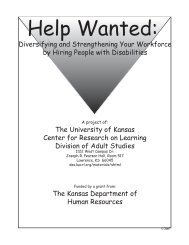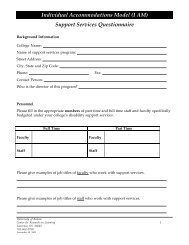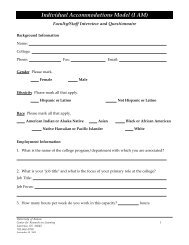multiplechoice
Download PDF file - KU Center for Research on Learning
Download PDF file - KU Center for Research on Learning
- No tags were found...
Create successful ePaper yourself
Turn your PDF publications into a flip-book with our unique Google optimized e-Paper software.
tape recorder for a student, you mustallow it. As a general rule, any classroommaterial which a student typically wouldtake notes on, may be recorded. If you areconcerned about copyright or academicfreedom issues, it would be appropriatefor you to work with DSS and the studentto devise a contract which would specifyhow the tapes may be used (i.e. only forthe student’s personal use, during theduration of the current academic semester)and proper disposal procedures.Accommodations which requirethe instructor to be minimallyinvolved.Assistive Listening DevicesSome students with hearing impairmentsuse assistive listening devices in theclassroom. Assistive listening devicesamplify and transmit sound. Usuallythe person speaking wears some typeof microphone, which transmits sounddirectly to a receiver being worn by thestudent. You may be asked to wear atransmitter or microphone during class.You may also need to restate questions orcomments that are made by other studentsso that this information is transmitted tothe student with the hearing impairment.In a small group (7-10) discussion class,it may be most effective to use a devicethat could be handed around the roomor set in the middle of a table permittingeach speaker to speak into the transmitter.However, you should discuss this withthe student prior to implementing it in theclassroom.Adapting an AssignmentSometimes accommodating a student canbe as simple as adapting an assignment.For example, a student in a psychologycourse was required to keep a daily journal.Accommodating Students with Disabilitiesin the ClassroomIt was difficult for a student who was blindto keep up. First, she had to write the journalentry with her Perkins Brailler first, thenshe had to get it transferred to written textso she could give it to her professor in areadable format. The professor suggested thatthe student speak her journal entries into atape recorder and submit them on tape.Extended Time on TestsWhen a recommended accommodation isadditional time on tests, an instructor maychoose to proctor the exam themselves, or ifthis is not feasible, arrangements can be madeto have the DSS office proctor the exam.Accommodations which require moresignificant involvementby the instructor.Testing in Different FormatIn some circumstances an alternative testingmethod will be an approved accommodationfor a student. An instructor may need toadapt an examination or permit an alternativemethod for recording answers.Alternative methods of recording answersSome disabilities make it very difficult toaccurately fill out a Scantron or othercomputer scored answer sheet. On a <strong>multiplechoice</strong>exam an instructor may need to permita student to circle his or her answers on thetest document. The instructor will need tohand score the exam. Other examples includepermitting a student to speak answers intoa tape recorder or to type answers on atypewriter or computer.Alternative testing formatsPermitting students to show their knowledgeor mastery of the subject matter, by using analternative testing method may be a necessaryaccommodation, provided that the changein method doesn’t fundamentally alter the
education program. For example, permittingan oral exam in lieu of a written exam may bepermissible unless the purpose of the exam isalso to test the writing ability of the student.Likewise, permitting an essay exam in lieu ofa multiple-choice exam or vice versa may beacceptable in some situations.Adaptations such as these ensure evaluationof the student’s achievement in the course,rather than reflecting the student’s impairedsensory, manual, or speaking skills.Providing Technical VocabularyTechnical vocabulary may be unfamiliar tostudents and an interpreter. Preparing alist of such terms will help students andinterpreters keep up with any lecture.A Note about CourseSubstitutions & WaiversWhether to grant a course substitution orwaiver is a decision reserved for the schooladministration in consultation with thestudent, DSS, the instructor, and the relevantacademic department. Requests for coursesubstitutions or waivers must be handled ona case-by-case basis.Waiver or substitution of a course may be anappropriate accommodation when it is beingsought for non-essential courses.Consider the following illustrationsIf swimming is a required course and astudent’s physical disability prevents themfrom swimming, it would be appropriate topermit the student to take a course in healthor wellness in place of the swimming class.Two students with documented learningdisabilities, that affect their ability to domath, have requested that they be allowed tosubstitute a logic or philosophy class in placeof college algebra. Student A is a recreationalAccommodating Students with Disabilitiesin the Classroomtherapy major. Student B is a business major.Both students have completed a majority ofthe prerequisite classes for their programof study and both are in good academicstanding. The committee reviewing theserequests grants student A’s request anddenies student B’s request for a substitution.This is permissible because the committeedeemed college algebra essential to studentB’s course of study, but not essential forstudent A. Over half of the upper levelbusiness courses student B needed to take tocomplete her degree required college algebraas a prerequisite. Whereas none of studentA’s remaining classes required algebra.ConfidentialityConfidentiality of disability and accommodationrelated information is essential. All disabilityinformation that a student chooses toshare with an instructor should be used onlyfor arranging accommodations. An instructormust not disclose or discuss informationabout a student’s disability or accommodationswith other persons, unless the studenthas authorized the disclosure.Having a disability revealed is oftenmentioned by students with disabilities asthe situation they fear the most at school.No student wants to be labeled as different.If you reveal a student’s disability to otherstudents, you have violated the trust that thatstudent has in you and the college and theresults can be devastating for the student.Some disabilities will be obvious (e.g., astudent in a wheelchair, a student who isblind), but there are many more disabilitiesthat are not so obvious. These disabilitiesare usually only revealed to you so that theproper accommodations can be provided togive the student an equal opportunity tolearn in your classroom.






